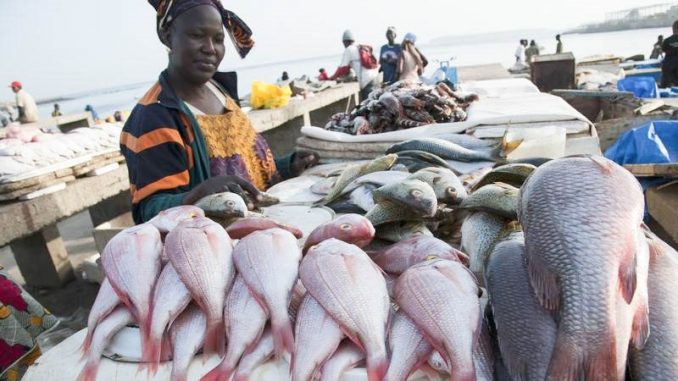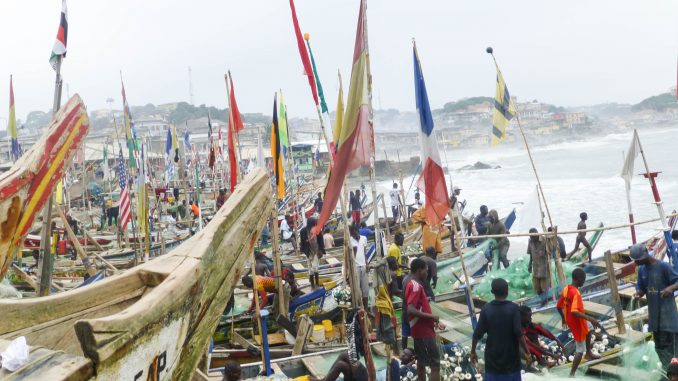
Fishing in Elimina, Ghana. Photo: UNU-INRA
The Sustainable Development Goal (SDG) 14 aims to promote the conservation and the sustainable use of oceans, seas and marine resources for development. One of the most important water-dependent sectors is the fishery sector, which makes an important contribution to food security globally. For instance, in Africa, fish provides a lot of people with most of their daily animal protein. The sector also employs many people and provides income opportunities.
Despite the importance of the sector, Africa’s marine and inland fisheries are reaching their limits. For example, in Ghana, just like in many other African countries, marine and some inland fisheries have been overfished, resulting in reduced fish stocks. In response to the challenges, the United Nations University Institute for Natural Resources in Africa (UNU-INRA) supported a study that investigated the potential of the fishery sector to mitigate poverty and unemployment in ten African countries namely Chad, Egypt, Ethiopia, Madagascar, Mauritania, Morocco, Namibia, Niger, Seychelles, São Tomé and Príncipe.
Fishing in Elimina_ Ghana- Photo-%0D%0A UNU-INRA
The findings of the research indicated that the ability of the fishery sector in these countries to mitigate poverty and reduce unemployment was unattainable, mainly due to over-exploitation of the fishery stock, underutilization of the fishery resources in some countries and high employment pressure. To help address these challenges, the research proposed aquaculture prioritization in Africa, particularly in the countries with high employment pressure (Chad, Ethiopia, Madagascar, Morocco and Mauritania); and those with over exploitation of the fishery stock (Egypt, Chad, Ethiopia, and São Tomé and Príncipe). This is to help reduce the existing pressure on the fishery ecosystem, and create alternative employment opportunities. For countries with underutilised fishery resources (Madagascar, Mauritania, Morocco, Niger, Namibia, and Seychelles), the study suggested more investment in modern fish harvesting technologies, in order to improve income derived from the sector.
A woman selling fresh fish. Photo Credit: Greenpeace
In addition, the research found high border rejection rates on fish exports from the study countries. This was attributed to quality deterioration as a result of non-compliance with export regulations relating to hygienic conditions, adulteration (missing documents), bacterial contaminations, use of food and feed additives, packaging and labelling issues among others. Perhaps the study’s suggestion to strengthen quality control systems across the fish supply chains in Africa to ensure adherence to standards, could help increase exports of fish products for more economic benefits.
Commenting on the study, Dr Shiferaw Mitiku Tebeka, the researcher noted that “the findings of the research confirmed that wild-catch fishing in many African countries is under intense fishing pressure and there is the need for strict adherence to regulations to restore the destroyed fisheries resources”.
“These findings provide empirical evidence that the fishery sector in Africa is confronted with various challenges and that there is an urgency to design and propose policy options for various stakeholders to facilitate the adoption of best approaches towards the development of the sector”, observed Dr Elias T. Ayuk, Director of UNU-INRA, in his comment on the research supported by the Institute.
It is clear that the challenges in the fishery sector are similar in many African countries. For a sector that provides food, jobs and income for many people, perhaps increased awareness on best practices on the part of policy actors and all key stakeholders in Africa, could help conserve and sustainably use water resources such as oceans, seas and marine towards sustainable development.
This article, written by Praise Nutakor, Communications and PR Associate of UNU-INRA, is based on the United Nations University Institute for Natural Resources in Africa’s (UNU-INRA) policy brief entitled “Sustaining Fishery Resources for Economic Growth in Africa”, by Shiferaw Mitiku Tebeka. The policy brief and working paper on the research are available on UNU Collections.




